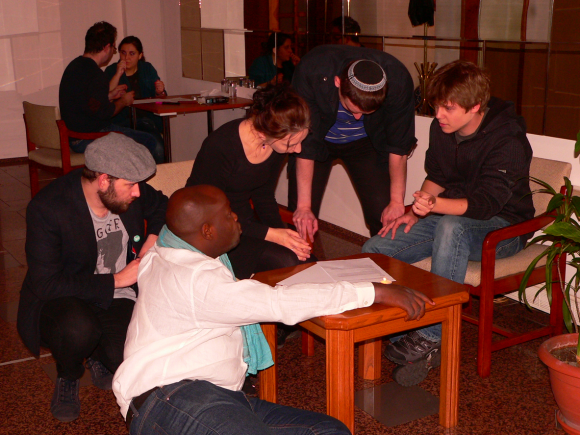Poverty Exposed | 2014
A training course to challenge the patterns of poverty
EYCE training course “Poverty Exposed: A training course to challenge the patterns of poverty” took place from 4th – 11th May in Sofia, Bulgaria. It brought together 28 participants, team members and experts. The participants came from 13 different countries, among them Lebanon and Nigeria. There were 13 female and 15 male participants. In addition to Christian participants, there were also two participants from a Jewish background which enriched the group and the discussions, as well as the spiritual aspect of the event by presenting their praying tradition. The diversity of the geographic, social etc. backgrounds of the participants ensured an intensive discussion and exchange.
The training course aimed at providing young people with knowledge about mechanisms behind poverty and to equipping them with tools to challenge the patterns of poverty.
In order to achieve this aim, the following objectives were identified:
- to explore various theological and ethical concepts to overcoming poverty;
- to study different mechanisms of poverty in social and political dimensions;
- to develop together with the participants solidarity-based approaches to tackle poverty in their own contexts;
- to engage the local community in a concrete action with the participants that changes the local reality;
- to provide an overview of situations in different countries and enable the exchange of experiences and good practices.

EYCE organised this activity together with its member organisation in Bulgaria – Christian Youth Council in Bulgaria (CYCB). In addition, during the training course, EYCE established a partnership and cooperation with the Bread Houses Network and local charity of Orthodox Church in Bulgaria. The contact and partnership with these organisations will be kept for the future activities of EYCE and in particular the campaign.
The main working methodology was the non-formal education. The participants were led through the process of the training course by using interactive and practical methods, such as group discussions, creative presentations, simulation game and practical workshops.
The first part of the training course was more theoretical. To secure that there is a logical flow in the training course, the programme started with exploring the concepts and language that is used, as well as looking into different understandings of poverty in different contexts and cultures, as well as situations in various countries.
Then a good factual and theoretical base for discussion was set by a guest speaker form Eurodiaconia, Ms. Therese Schlage, who gave insight into conceptual, definitions, facts and figures both in Europe and Globally. The participants also offered overview of poverty in their own contexts, how they experience poverty and how they are already engaged to fight it. Through this approach they got both, an overview about the situation in other countries and an impression of how the other participants are involved in addressing the issue of poverty. The most important conclusion from this part was the realisation of similar challenges and the strength of facing the challenges together. A great value was the participant from Nigeria. On one hand, he gave insights regarding the situation in Africa, offering the global perspective to the discussion, showing how privileged most of Europeans are. On the other hand, he discovered that poverty and sorrow does not only exist in Africa, but also the wealthy Europe struggles with different, yet devastating faces of poverty.
This was followed by looking into the concepts of solidarity, kindness and everyone being a human being and deserving the same rights. Through the case studies and simulation game the participants explored what it means to be poor and why solidarity and kindness is needed.
In order to see what are the possibilities to act within the churches and church communities, a theological approach was employed – a guest speaker Rev. Daniel Mueller-Thor introduced different theological concepts dealing with poverty, participants studied various texts, as well as discussed what are the opportunities for churches to engage on different levels in overcoming poverty.
The second part of the training course was more practical. The focus moved to specific skills that can be used to overcome poverty, such as project planning, fundraising, creative awareness raising etc. To approach the practical outcomes and inspire the participants for action, they were given the opportunity to share and present already existing projects, where they are involved, also they met with local organisations to exchange experience. This was followed by practical workshops on specific skills. Then, to follow up and use in practice the knowledge and skills gained, the participants prepared a street action together. This helped participants to realise ideas that emerged during the first part of the event and understand that there are aims that they can achieve, they were encouraged to actually implement their plans.
It was planned to visit a local project to make a practical impact on the local level, however it was not possible due to difficult arrangements. Nevertheless, the group met with the representatives of two local organisations to discuss the situation regarding poverty and social justice in Bulgaria and the activities that are undertaken to change the situation.
Finally, each participant formulated three concrete steps they would undertake as soon as they get home. The load of work that needs to be done and the deterring effect of only very small things that can be achieved by individuals were identified as main threshold for people to do something about the grievances. Therefore these concrete steps were a promise to themselves, which they will be reminded of within six months. In addition, EYCE’s Campaign to Overcome Poverty “Break the Chains!” was introduced and the possibilities to join and contribute explained.
A great asset of the programme was the intercultural and ecumenical atmosphere, which offered many possibilities for the participants to learn from one another, as well as to increase acceptance, understanding and solidarity.


